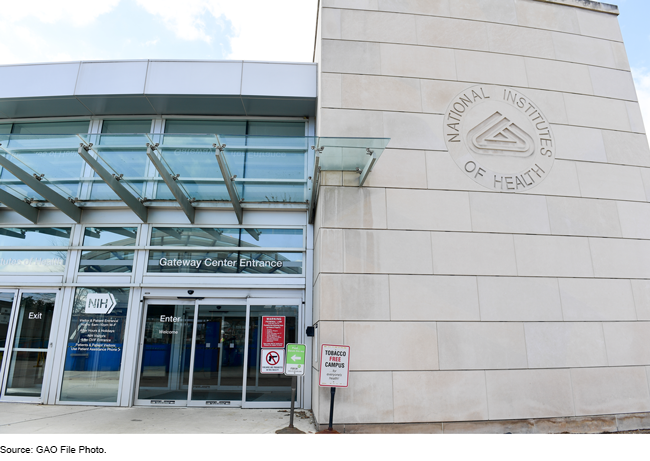GAO* Report, Cybersecurity: National Institutes of Health Needs to Take Further Actions to Resolve Control Deficiencies and Improve Its Program
The National Institutes of Health's duties include researching infectious diseases and administering over $30 billion a year in research grants. NIH uses IT systems containing sensitive data to carry out its mission.
This report is a public version of our June 2021 report on NIH cybersecurity. The agency has taken actions intended to safeguard the confidentiality, integrity, and availability of its systems. However, we found many weaknesses related to identifying risks, protecting systems, and more. We have made 219 recommendations for improvements. NIH has partially implemented more than half and fully implemented about a third of them.

What GAO Found
As GAO reported in June 2021, the U.S. National Institutes of Health (NIH) implemented information security controls — both for its security program and selected systems—intended to safeguard the confidentiality, integrity, and availability of its information systems and information. However, GAO identified numerous control and program deficiencies in the core security functions related to identifying risk, protecting systems from threats and vulnerabilities, detecting and responding to cyber security events, and recovering system operations (see table). GAO made 219 recommendations — 66 on the security program and 153 related to system controls — to address these deficiencies.
Number of GAO-Identified Information Security Program and Control Deficiencies at the U.S. National Institutes of Health and Associated Recommendations by Core Security Function as of June 2021
|
Core security function |
Number of information security program deficiencies |
Number of information security program recommendations |
Number of selected system control deficiencies |
Number of selected system control deficiency recommendations |
|
Identify |
12 |
26 |
0 |
0 |
|
Protect |
4 |
6 |
78 |
141 |
|
Detect |
5 |
11 |
5 |
11 |
|
Respond |
7 |
16 |
1 |
1 |
|
Recover |
4 |
7 |
0 |
0 |
|
Total |
32 |
66 |
84 |
153 |
Source: GAO. | GAO-22-104467
As of June 2021, NIH had made progress in resolving the deficiencies by implementing 25 (about 38 percent) of the 66 information security program recommendations, and 37 (about 24 percent) of the 153 recommendations to address control deficiencies for selected systems. The figure shows the status of NIH's efforts to implement the 219 recommendations.
Status of GAO Recommendations to the U.S. National Institutes of Health as of June 2021

Until NIH fully implements these recommendations and resolves the associated deficiencies, its information systems and information will remain at increased risk of misuse, improper disclosure or modification, and destruction.
Why GAO Did This Study
NIH responsibilities include conducting research on the prevention of infectious diseases such as COVID-19, administering over $30 billion annually in medical research grants, and supporting research on pathogens, including those that have the potential to pose a severe threat to public health and safety. In carrying out its mission, NIH relies extensively on information technology systems to receive, process, and maintain sensitive data. Accordingly, effective information security controls are essential to ensure the confidentiality, integrity, and availability of the agency's systems.
GAO was asked to examine cybersecurity at NIH. In June 2021, GAO issued a limited official use only report on the extent to which NIH had effectively implemented system controls and an information security program to protect the confidentiality, integrity, and availability of its information on selected information systems.
This current report is a public version of the June 2021 report based on GAO's review of the agency's information security program and 11 selected systems. In addition, for this public report, GAO determined the extent to which NIH has taken corrective actions to address the previously identified security program and system control deficiencies and related recommendations for improvement. GAO reviewed supporting documents regarding NIH's actions on the previously identified recommendations.
For more information, contact Jennifer R. Franks at (404) 679-1831 or franksj@gao.gov.
More Articles
- Women's Labor Force Exits During COVID-19: Differences by Motherhood, Race, and Ethnicity
- GAO Report On Air Travel and Communicable Diseases: Federal Leadership Needed to Advance Research
- Why Some Cities Lost Population in 2021: One Specific Group — Younger Adults in Their Early 20s to Mid-30s
- Justice Department Secures Agreement with CVS Pharmacy, Inc. to Make Online COVID-19 Vaccine Registration Accessible for People with Disabilities
- Journalist's Resource: Religious Exemptions and Required Vaccines; Examining the Research
- Testimony of Secretary of the Treasury Janet L. Yellen before the Senate Committee on Banking, Housing, and Urban Affairs: "The debt ceiling has been raised or suspended 78 times since 1960"
- Jo Freeman's Review of "Frankly, We Did Win This Election" By Michael C. Bender
- Researchers From Yale University, Stanford Medical School, University of California, Berkeley: Largest Study of Its Kind Finds Face Masks Reduce COVID-19
- The White House Says Boosters for All: Here’s What You Need to Know: “Stick to the advice from the CDC and the FDA, because they are doing their very best to ensure maximum protection and safety”
- National Institutes of Health: A Lancet Study Published Highlights Orphanhood as An Urgent and Overlooked Consequence of the Pandemic






